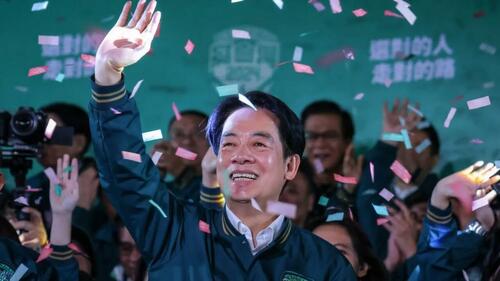Taiwan Elects William Lai President In Snub To China, Beijing Responds By Stressing ‘Inevitable Reunification’

William Lai Ching-te from the governing Democratic Progressive Party (DPP) has emerged victorious in Saturday’s historic Taiwan presidential election, and Beijing is not happy, having immediately issued a rebuke after having urged the populace not to vote for him, saying the outcome “will not impede the inevitable trend of China’s reunification.”
Beijing further claimed that the DPP doesn’t represent mainstream public opinion on the island, despite the fact that Lai, who serves as the current vice president, has just taken over 40% of the votes cast—according to partial early results—in the three-way race with Hou Yu-ih from the conservative Kuomintang (KMT) and former Taipei Mayor Ko Wen-je from the Taiwan People’s Party (TPP). It was a comfortable victory and a resounding message to China.
In his victory speech, Lai said, “I want to thank the Taiwanese people for writing a new chapter in our democracy.” And then he issued words widely seen as a direct jab at China: “We are telling the international community that between democracy and authoritarianism, we will stand on the side of democracy,” he declared.
But he also expressed hope that his administration will establish a “healthy and orderly” environment based on parity and mutual respect. This was quickly met with Beijing’s Taiwan Affairs Office spokesperson Chen Binhua saying in a strong and terse statement that “Taiwan is China’s Taiwan,” according to Xinhua.
Per Taiwan media, all polling stations have reported:
- TPP’s Ko Wen-je and Wu Hsin-ying 3,690,466 (26.46%)
- DPP’s Lai Ching-te and Hsiao Bi-khim 5,586,019 (40.05%)
- KMT’s Hou Yu-ih and Jaw Shaw-kong 4,671,021 (33.49%)
Turnout was strong, as expected given the shadow of Xi’s China looming large over the comparatively tiny democratic island.
Lai, along with his running mate Hsiao Bi-khim, Taiwan’s former representative to the United States, won a total of more than 5.5 million votes. Taiwan’s electoral system is based on first-past-the-post voting, awarding the victory to the presidential-VP pairing with the highest percentage of votes.
Turnout on the self-ruled island was put at more than 70 percent, with some 19.5 million Taiwanese eligible to vote.
Days before Saturday’s election, Liu Jianchao, head of international liaison for China’s ruling Communist Party, had a rare meeting and candid discussion with representatives of Biden’s national security council in Washington, both sides confirmed. This came just days ahead of presidential elections in Taiwan, which has temporarily grabbed the world’s attention as other global flashpoints sow unpredictability – specifically Ukraine, Gaza, and the Red Sea. Beijing is said to have relayed to the White House its ‘red line’ concerning Taiwan and “the importance of peace and stability across the Taiwan Strait and in the South China Sea.”
A Chinese readout of the meeting, wherein the US side was led by US deputy national security adviser Jonathan Finer, affirmed that Liu “stated China’s positions on issues like Taiwan and the South China Sea.” Important also concerning the timing is that he’s highest-ranking Chinese official to visit the US since the Xi-Biden summit.
Per Finer and the US delegation, they talked about “challenges in the Middle East, Russia’s war against Ukraine, and cross-strait issues.”
Prior to this, just weeks ago, China warned of further trade sanctions on Taiwan in the event the ruling party “stubbornly” commits to supporting independence. Spokesman for China’s Taiwan Affairs Office Chen Binhua had addressed a message to the ruling Democratic Progressive Party (DPP), saying “If the DPP authorities are determined to persevere, continue to stubbornly adhere to their Taiwan independence position, and refuse to repent, we support the relevant departments taking further measures in accordance with the regulations.”
On December 27 Chinese leader Xi Jinping issued a rare, ultra-blunt warning against anyone “making Taiwan secede from China by any means,” given he said of the self-ruled island that “China’s complete reunification is an inevitable trend” and that reunification is “what the people desire.” He further urged that the Chinese Communist Party must set its sights of a grander policy of “resolving the Taiwan question in the new era.”
🇹🇼🇨🇳CHINA'S FAILED ELECTION INTERFERENCE
— Mario Nawfal (@MarioNawfal) January 13, 2024
Despite an intense multi-pronged strategy to influence Taiwan's Presidential Campaign, China's efforts fell short. Their chosen candidate conceded the election, while pro-independence candidate Lai Ching-te clinched the win. The efforts… https://t.co/BDduvHR8Vs pic.twitter.com/txIYxIr521
These somewhat fiery words from Xi loomed in the backdrop when Liu was in Washington this past week. The high-ranking diplomat presented similar words of warning to an event hosted by the Council on Foreign Relations wherein he again underscored the red line: “For China, the Taiwan question is at the very core of the core interests. It’s the red line that must never be crossed,” Liu said.
The Foreign Ministry then followed the next day (Thurs) by directly warning Washington that it must avoid sending the “wrong signals” to Taiwan. “We urge the US side … to stop interfering in the local elections in Taiwan in whatever ways, and stop sending wrong signals to ‘Taiwan independence’ separatist forces,” a spokesperson said.




